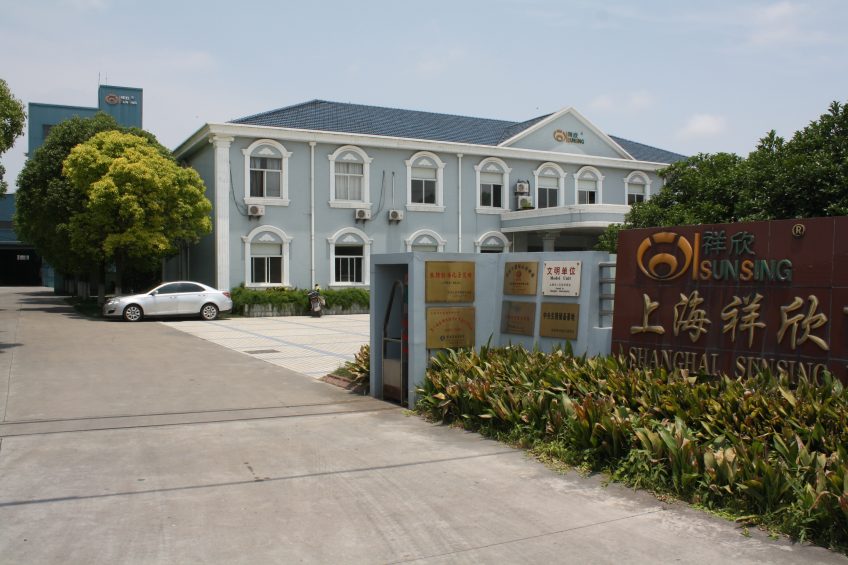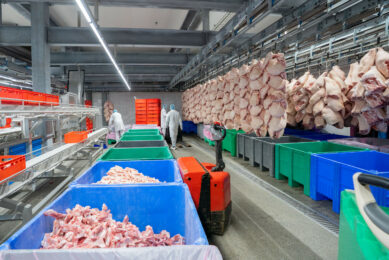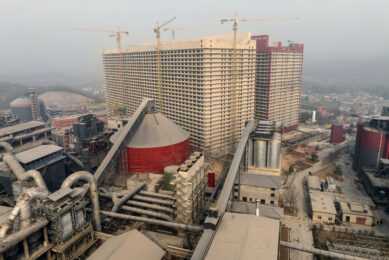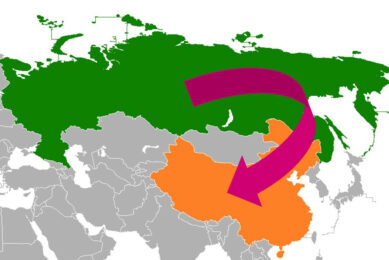Pig production in China – not only the sky is the limit

With China developing at an astonishing pace, it remains to be seen how agriculture can adjust itself to the new reality. Even in China, pig farming close to major cities is becoming difficult. Still, Sunsing farms makes a good attempt with Shanghai being at close range.
Nowhere in the world it is more difficult to access a swine farm than in China. Modern professional pig breeders are very aware of the risk of infection visitors may bring with them – and therefore usually a strict no-barn visit policy is applied.
Sunsing farms, located in Laogang, just south of Shanghai’s international airport Pudong, does offer an alternative – an extensive video system to take a look inside its breeding facilities. From 36 different cameras, real-time footage is available, so seated in a comfortable conference room, all farm houses can be ‘visited’. This way, the farm can show visiting potential gilt buyers how the management is being performed.

Sunsing, to date having about 4,200 sows, sells breeding gilts to commercial finisher farms. Farmers usually travel long distances to Laogang to pick up the breeding gilts, when they are about 60-65 kg. Yan Guoxiang, Sunsing general manager, explains that the breeding animals go to small and medium sized commercial farms all over in China. This includes destinations as far as Tibet, Inner Mongolia and provinces in North Eastern China, as well as Yunnan and Hainan provinces in the south, the last being a journey of over 50 hours, Yan Guoxing adds. Breeding animals have also been shipped to Myanmar.
As for the barrows – the farm grows and finishes most of these itself.
Producing 19 piglets per sow per year, the farm is thriving. Quality breeding pigs continue to be scarce as the Chinese swine market is transforming at a speed beyond imagination. As long as a swine breeder manages to avoid detrimental effects of diseases like Porcine Epidemic Diarrhoea or highly pathogenic PRRS, the yuan renminbi will come his way.
Expansion plan
Being one of the largest commercial breeding farms in the Shanghai province (22 million inhabitants), Sunsing has also taken its share of profits. New investmets are therefore on the way. A new stretch of land of 30 x 10 km has been bought, near the famous 32 km Donghai Bridge at the Pacific shores, for future expansions which are about to be finished in 2015. When finished, total farm size will have doubled to 8,600 breeding animals. The new three-site farm complex will house 4,400 sows and include a boar stud.
European and American technology shall be used in the new complexes. An automatic feeding system by Big Dutchman will be applied throughout the farm site. In addition, US-based Osborne Industries will provide weighing equipment, e.g. to do a back fat checks and monitor weight gain of growing gilts. The gestating sow houses will be equipped with crates and tunnel ventilation.
At the time of the visit, works had commenced on the first location of the expansion complex. A farrowing room and a gilt house neared completion – foundations were being laid for additional facilities for dry sows and growers.

Waste
A newly waste processing plant, in the main picture’s background, serves as a perfect metaphor for producing swine near Shanghai. Just as the metropolis is trying to keep tidy and clean, the big challenge for Sunsing at the present moment is already how to deal with his waste – as only 20% can be reused as fertliser on the lands after filtration. The remainder of the manure is currently being disposed of with help of the government – and in the future, some can be used for the additional lands, which will partly be used for growing wheat and rice. Still, the waste of an additional 4,400 sows requires a more extensive solution.
Yan Guoxiang found his solution in Europe – as a biogas installation will be part of the new facility. Underneath most new housing facilities a flushing system is being added underneath the slats. Water, faeces as well as urine will thus be directly be washed away towards the biogas installation. The energy from the biogas plant will be used to keep the farm going.

Biosecurity
Diseases like PRRS, PCV2, Foot-and-Mouth Disease and Classical Swine Fever are not clinically present on the farm, Yan Guoxiang says – and the pigs are being vaccinated against these. Still, biosecurity will be enhanced strongly at the new facility as the boar stud as well as the GGP nucleus will receive air filtration.
In addition, the new site’s biosecurity will be enhanced, as on the future site, visitors will be even stronger discouraged to pick up the breeding gilts. Instead, he considers organising the gilt transports himself.
This farm visit became possible through kind cooperation of Boehringer Ingelheim Animal Health.











